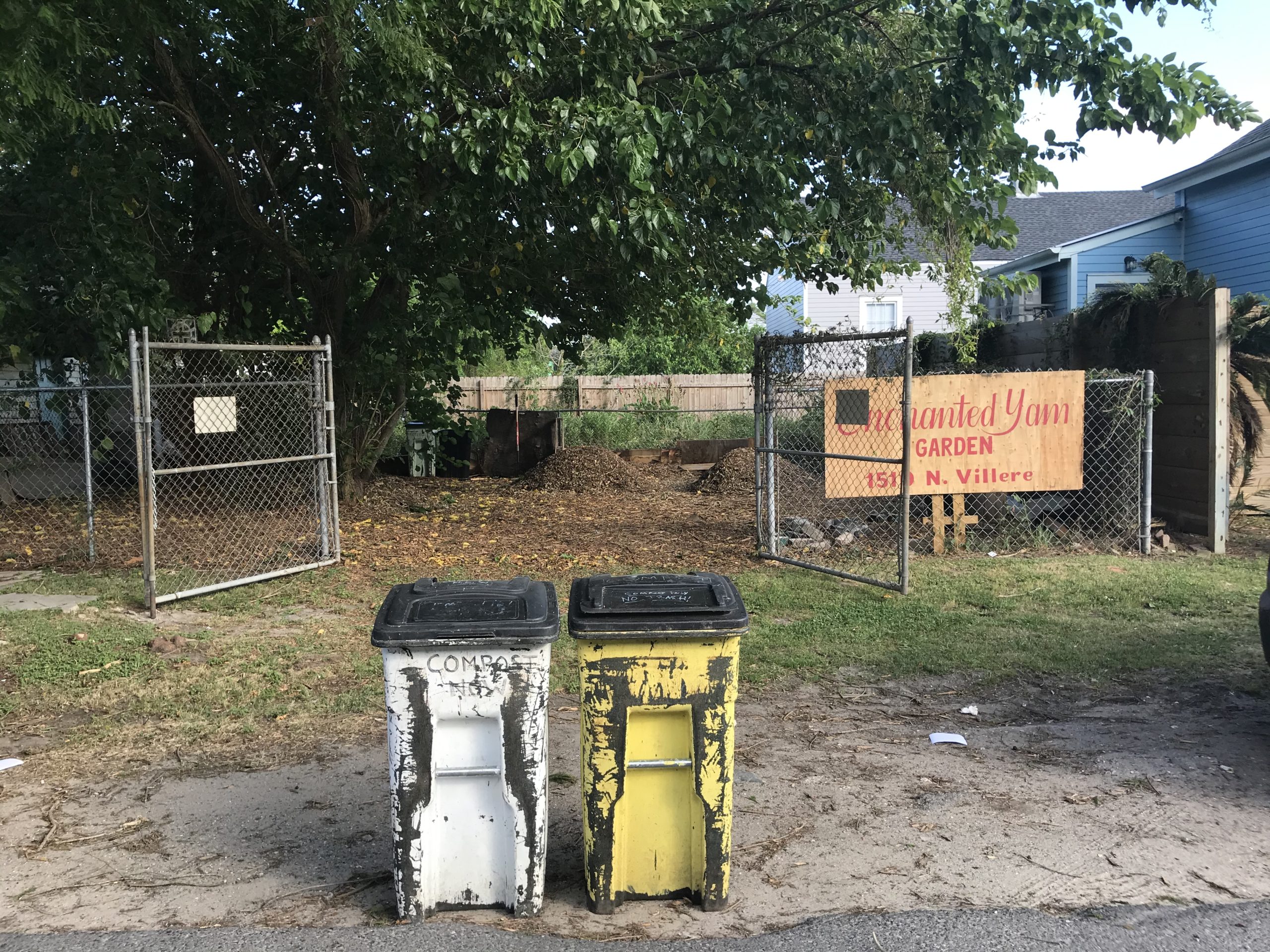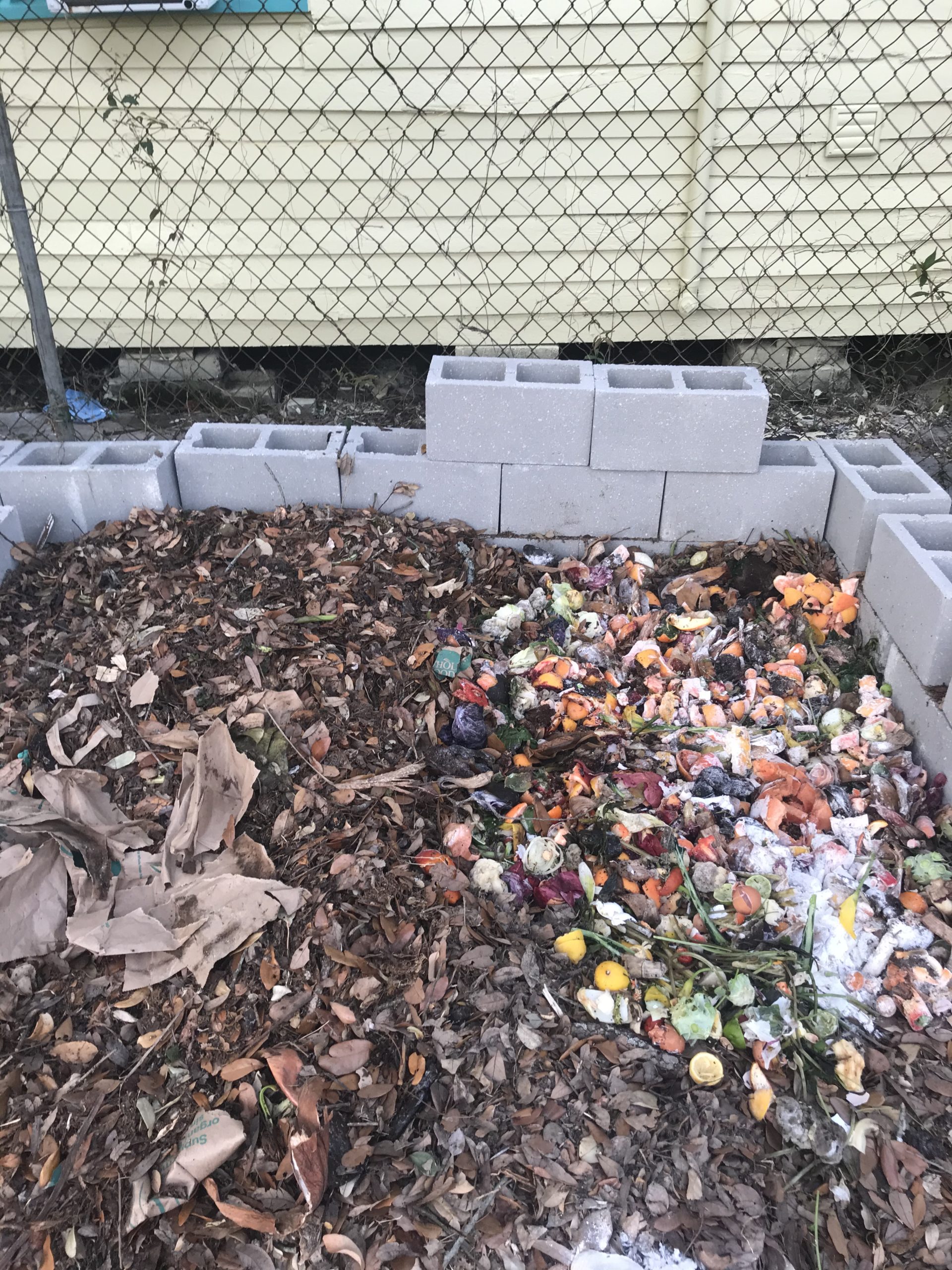
With recycling services pausing or not existing for some, composting is a great way to cut down on your garbage. (Photo provided by: Kelly Haggerty)
While many usual recycling services have been temporarily suspended during quarantine, lovers of Planet Earth remain tasked with finding ways to reduce environmental impact in the midst of a global pandemic. Composting, according to local environmental activists, is an easy, important, and highly beneficial option during quarantine and beyond.
Part 1 of this two-part series on composting during and after quarantine focused on benefits associated with diverting food scraps from the trash pickup and, ultimately, landfills in the region. This article breaks down the additional benefits of transforming compost into fertilizer for the enriched soil that local gardeners and farmers can then use to grow their own food.
Besides the varied benefits of keeping food scraps out of landfills, composting also contributes to the community by improving local food production and consumption, particularly the soil used to grow that food.
“Composting is probably the most regenerative way that we can give back to our food ecosystem,” said Brynn Comeaux Hutzler, program manager for the New Orleans Food Policy Advisory Committee.
Any compostable matter donated to local organizations they then redistribute among local and regional farms as well as home and commercial gardens. This improves the quality of the local food-growing soil, the produce that emerges from that soil, and the sense of community built around this regenerative tactic.
“After you add your food waste and other organic waste, and it becomes compost, then it’s a soil amendment, and that has multiple benefits,” said Lynne Serpe, founder of Compost NOW. “It’s going to improve nutrients in your soil and its resistance to disease. And very important in New Orleans, it’s going to improve the water retention rate of your soil. So it becomes yet another tool in stormwater management that everyone can do.”
But because of the current stay-at-home mandate, many restaurants remain closed or offer more limited sales and menus. As a result, organizations that process and distribute compost haven’t had nearly the same amount of food scraps donated from these restaurants and similar larger-scale food scrap producers.
“So it’s a great time to make your own personal contributions,” said Hayley Alexander, evaluation coordinator at Louisiana Public Health Institute.
“You can contribute to the healthy recycling patterns that the city does have,” said Kelly Haggerty, chair of the Food Waste and Recovery Working Group for the New Orleans Food Policy Advisory Committee and site director for Food Rescue US – New Orleans. “I know there’s a lot of skepticism around recycling.”
“But when you recycle with other community members, you actually know where your recycled materials are going,” Haggerty continued. “And that all becomes soil for when members of the community want to create garden beds or create or contribute to a garden in their backyard or build up soil.”
In addition to more time in the kitchen, many locals are spending more time in their garden, from tending their flowerbeds to growing their own food. But because of the quality of the native soil in this region, local gardeners often need compost-amended soil to ensure a more plentiful and healthy harvest.
“Everyone’s at home, and we’ve seen an increase in gardening in the backyard and maintenance and landscaping around the yard and people’s homes and residencies,” said Haggerty.
With more backyard gardeners comes a bigger demand for compost, which can at times be too expensive for budding horticulturalists to afford. Community compost donations and sales are a less expensive yet effective option for New Orleans area gardeners to access the healthy, fertile soil they need, particularly to grow their own food.
That homegrown food may prove to be an essential part of the “new normal” as more individuals confront the realities of our current food system locally, nationally, and internationally.
“We’ve seen with victory gardens throughout the various war years that local production of our food can actually help feed ourselves, our family, and our communities,” said Serpe. “I think we’re really seeing the recognition that the way we have been getting our food is not actually sustainable.”
“So I think in that way, people are like, yes, let’s compost. Let’s grow our own food,” Serpe continued. “Let’s try to figure out how to do this in a way that doesn’t cost a fortune. It’s also improving my soil, so that I can spend less money.”

The beauty of composting is in the small footprint and big growth. (Photo provided by: Kelly Haggerty)
New Orleans is home to a number of organizations and businesses in and around the composting and food waste management network. This has built a sense of community around these individuals’ willingness to share information and to teach and support local food growers, farmers, and gardeners.
“Folks that compost are very passionate about composting and there are a lot of them in this city,” said Hutzler. “There are a lot of composting networks and everybody has a lot more time on their hands, and you can directly reach out to someone and have a compost mentor.”
“Everyone within this food waste and recovery network within New Orleans is a really wonderful person,” said Alexander. “They’d be more than happy to educate on what’s happening and how people can take part in it.”
Working on the compost in the backyard or dropping off a bag of food scraps at one of several local compost dropoff locations is not only a task completed. It’s one that takes better care of the planet and local community, even when they’re mostly stuck at home for quarantine.
“What’s great about a lot of the composting sites is that there’s little to no human interaction,” said Alexander. “So it’s a really simple thing to do. And it’s a good thing to check off the box to be like, hey, I’ve done something really good today.”
Having those productivity tasks to check off the day’s to-do list can bring a much-needed sense of accomplishment and fulfillment as quarantine stretches on.
“And I know for me personally at this time, the list of productive things I want to do keeps narrowing,” said Alexander. “And doing little small things just like composting and collecting your own waste and being more mindful about how much waste you do produce as a single person or however many people in your household is important at this time.”
As we search for ways to be productive, stave off boredom, and feel good about our time spent in quarantine, New Orleanians have options locally for easily integrating a composting practice into their lives. And this habit can be a healthy and environmentally forward-thinking contribution to continue doing our individual parts to protect Mother Nature and our community long after we settle into our “new normal.”
Click here for an interactive map of where to drop off saved food scraps for community composting.
 NOLAbeings
Multimedia artist Claire Bangser created NOLAbeings as a portrait-based story project that marries...
NOLAbeings
Multimedia artist Claire Bangser created NOLAbeings as a portrait-based story project that marries...
 Data corner: Adobe Suite (create a PDF, social media graphic, presentation, edit a photo and video
Data corner is where you go to work with analytics and top tech skills. It takes on everything from PERL and SQL to Canva and Sprout Social.
Data corner: Adobe Suite (create a PDF, social media graphic, presentation, edit a photo and video
Data corner is where you go to work with analytics and top tech skills. It takes on everything from PERL and SQL to Canva and Sprout Social.

[…] the benefits contained within these two categories are more vast than many may realize. This article focuses on the benefits compost brings by reducing waste in garbage cans and landfills, and the next composting feature covers the additional benefits of using food scraps as soil […]